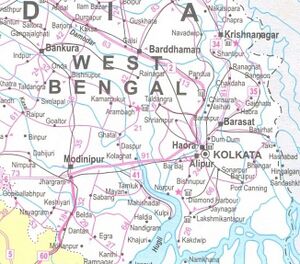Mangalkot

Mangalkot is a town in Katwa subdivision of Bardhaman district in West Bengal.
Location
Mongalkote is located at 23°30′51″N 87°53′28″E.
Origin
History
The dawn of early historical phase in Lower Ganga–Brahmaputra valley, comprising present West Bengal, Bangladesh and parts of Assam, is rather more obscure than it is in the Middle Ganga plains. The process began at least three hundred years later than that in the Mid–Ganga plains. The period therefore coincides rather with the rise of the Maurya rule, which probably extended to this region.
A continuity of settlements in certain sites hints at cultural evolution in the broad region we are discussing here, for example, at the two sites of Mangalkot and Pakhanna: At Mangalkot [1] in Katwa, Bardhaman (Burdwan District, cultural sequences spread from the Chalcolithic to the medieval times. Mangalkot is located on the banks of the Ajay river, a tributary of Bhagirathi. As such the Ajay–Kunoor rivers are significantly connected with the riverine communication network of eastern India. Brick structure comes from the Kushana period (1st - 3rd C. AD) onwards. More significantly, Mangalkot flares up into an urban settlement in the Sunga–Kushan phase. A continuity of cultural progress is not suggested here. However, the cluster of sites in the region, the rise of an urban node in this Radha region do signify a historical trend.
The cluster of sites that converge in the Radha region also include the Bankura sites, among whom, Pakhanna has been identified as having acquired urban dimensions along with Mangalkot. Situated near Susunia, on the south bank of Damodar river, Pakhanna witnessed the unfolding of chalcolithic village culture to urban culture of early historic period. B.D. Chattopadhyay has suggested that the pre–Gupta and early Gupta contexts in Pakhanna had a variety of antiquities, which may justify the site’s description as a modest urban centre in this temporal context. [2] These sites tell us about the possible transition of life from the simple village farming to trade–orientation and urbanity in some parts of the broad region of ancient Bengal.
Notable persons
References
Back to West Bengal

